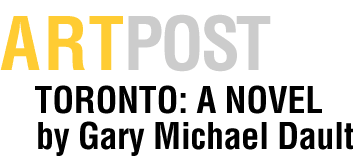Michael Moskos was sufficiently passionate
about contemporary art that it caused him something like anguish to attend
exhibition openings. There were
only a few galleries for which he had any respect anyhow. On this particular Thursday night, he
had made his way to one of them, impelled there by a long-standing friendship
with the artist, a swaggering, amusingly arrogant, fiercely defensive painter
named Rubel Force.
By the time Michael got to the Lucy Crater
Gallery, there were already a couple of hundred absurdly young people milling
about—none of whom Michael knew—all of them laughing too loud, leaning out like
starving baby birds for more wine, fiercely jabbing toothpicks into tiny cubes
of putty-coloured cheese and exerting great care not to be caught gazing, even
for an outlaw moment, upon any of Rubel’s pictures.
Which consisted, for this exhibition, of
exhaustingly detailed paintings of crumpled balls of cellophane, which, in the
course of their crumpling, had come to look sort of like various creatures—a
frog, a fish, a deer, a spermatozoa—and were therefore painted that way. The name of each cello-creature, just
in case its shape didn’t tell the story, was neatly lettered in black paint
across the bottom of each painting.
Michael spotted Rubel at the far side of
the room, deep in conversation—or, more likely—deep in a desperate avoidance of
conversation, with a massive young woman in overalls and nothing else who,
ignoring all gallery remonstrances to the contrary, was dragging around with
her, on a leash, an ugly little dog, shaped like a bottle brush.
“Michael the Big Writer!” shouted Bliss
Carmen—for indeed it was Bliss Carmen loudly holding forth to a now
considerably diminished Rubel Force—“come and meet Rubel!”
“Hello Bliss. Yes, I know Rubel.
We go way back,” he told her as he and the beleagered painter shook
hands.
“Nice show,” he said to his friend.
“Thanks,” said Rubel, looking around for
some means of escape from Bliss’s volubility. “Excuse me, I think I see Knox, and I’d better go say
hello.” And he trundled gratefully
away.
Knox Penworth was the art critic for The
Globe & Mail. He wasn’t as much a writer as he was a
party animal, thought Michael, but he was sort of the only art critic in
town. Michael never read his
stuff.
“So,” boomed Bliss, “how’s Zorba?”
“Who?” asked Michael.
“You, dummy,” laughed Bliss.
Michael regretted ever
telling her he was half Greek.
“What are you doing here, Bliss?”
“Me? I love art. And I’ve gut a lot of artist
friends. See that guy over by the
wall—keeping to himself? That’s my
pal, Homer Rubik.”
Michael looked, and was astonished to see
that Homer Rubik was the guy who was sitting across from him on the subway only
a few days before—the guy struggling through Angels & Demons. The
feral reader!
“He’s an artist too?”
“Oh sure, a really great artist,” thundered Bliss. You want to meet him?”
“Oh well…no…not right now….”
But Bliss was already
gesturing wildly to Homer, insisting, in unmistakably imperative sign language,
that he join them.
Homer came slouching up. He didn’t seem to recognize Michael—for
which Michael was grateful.
“Homer is a classical artist!” Bliss announced.
“Which means what exactly?” asked Michael.
“It means he draws and paints like Raphael or Michelangelo!” Bliss told him. She
turned to Homer. “Isn’t that
right?”
Homer emitted a sort of low growl and
finally nodded his head.
“Yeh.”
“How do you manage that?” Michael asked.
“I took a course at night school.”
“What kind of a course?”
“Old Master Drawing and Painting,” Homer
told him.
“You like all that high renaissance
material, do you?” asked Michael.
“What?” said Homer.
“Oh you know…frescoes and popes and….”
“I like doing things properly,” said Homer
abruptly. “I’m reading this book
right now about a bunch of renaissance guys called the Illuminati and how they
kill some popes who don’t believe in them. “
A tiny shudder ran down Michael’s spine.
“What’s the name of the book?”
“I don’t remember book names,” Homer
replied, swaying from one foot to the other and looking increasingly
uncomfortable. “Something about demons.”

